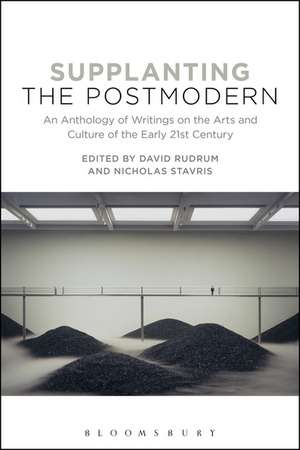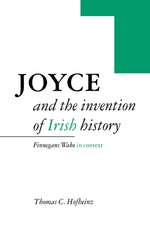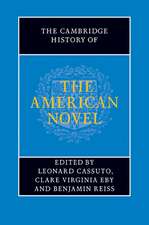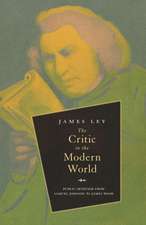Supplanting the Postmodern: An Anthology of Writings on the Arts and Culture of the Early 21st Century
Editat de Dr. David Rudrum, Nicholas Stavrisen Limba Engleză Hardback – 4 noi 2015
| Toate formatele și edițiile | Preț | Express |
|---|---|---|
| Paperback (1) | 196.73 lei 6-8 săpt. | |
| Bloomsbury Publishing – 4 noi 2015 | 196.73 lei 6-8 săpt. | |
| Hardback (1) | 835.51 lei 6-8 săpt. | |
| Bloomsbury Publishing – 4 noi 2015 | 835.51 lei 6-8 săpt. |
Preț: 835.51 lei
Preț vechi: 1133.67 lei
-26% Nou
159.87€ • 167.37$ • 132.29£
Carte tipărită la comandă
Livrare economică 05-19 aprilie
Specificații
ISBN-10: 1501306871
Pagini: 400
Ilustrații: black & white illustrations
Dimensiuni: 152 x 229 x 22 mm
Greutate: 0.7 kg
Editura: Bloomsbury Publishing
Colecția Bloomsbury Academic
Locul publicării:New York, United States
Caracteristici
Notă biografică
Cuprins
Recenzii
Rudrum and Stavris have put together a fascinating collection of speculations, arguments, and manifestos that engage in very different ways with the question of postmodernism's demise. That this question is shown to involve asking whether there actually is or was a single cultural tendency that can be labelled "postmodernism", or whether its aftermath can be similarly labelled by a single term, is a sign of the editors' own open-minded (postmodern?) approach.
It may well be, as the editors suggest, that postmodernism was the last time we looked coherent enough to oppose ourselves. If so, then Supplanting the Postmodern provides the dual service of recalling, as postmodernism becomes forgettable, its inescapability, while doing away with all efforts to prolong it. I have difficulty imagining serious aesthetic discussion apart from the background this book provides.
A useful collection of writings, helpfully designed to make students think about contemporary cultural dynamics.
Descriere
For more than a decade now a steadily growing chorus of voices has announced that the 'postmodern' literature, art, thought and culture of the late 20th century have come to an end. At the same time as this, the early years of the 21st century have seen a stream of critical formulations proclaiming a successor to postmodernism. Intriguing and exciting new terms such as 'remodernism', 'performatism', 'hypermodernism', 'automodernism+?, 'renewalism', 'altermodernism', 'digimodernism' and 'metamodernism' have been coined, proposed and debated as terms for what comes after the postmodern. Supplanting the Postmodern is the first anthology to collect the key writings in these debates in one place.
The book is divided into two parts: the first, 'The Sense of an Ending', presents a range of positions in the debate around the demise of the postmodern; the second, 'Coming to Terms with the New', presents representative writings from the new '-isms' mentioned above. Each of the entries is prefaced by a brief introduction by the editors, in which they outline its central ideas, point out the similarities and/or differences from other positions found in the anthology, and suggest possible strengths and limitations to the insights presented in each piece.












